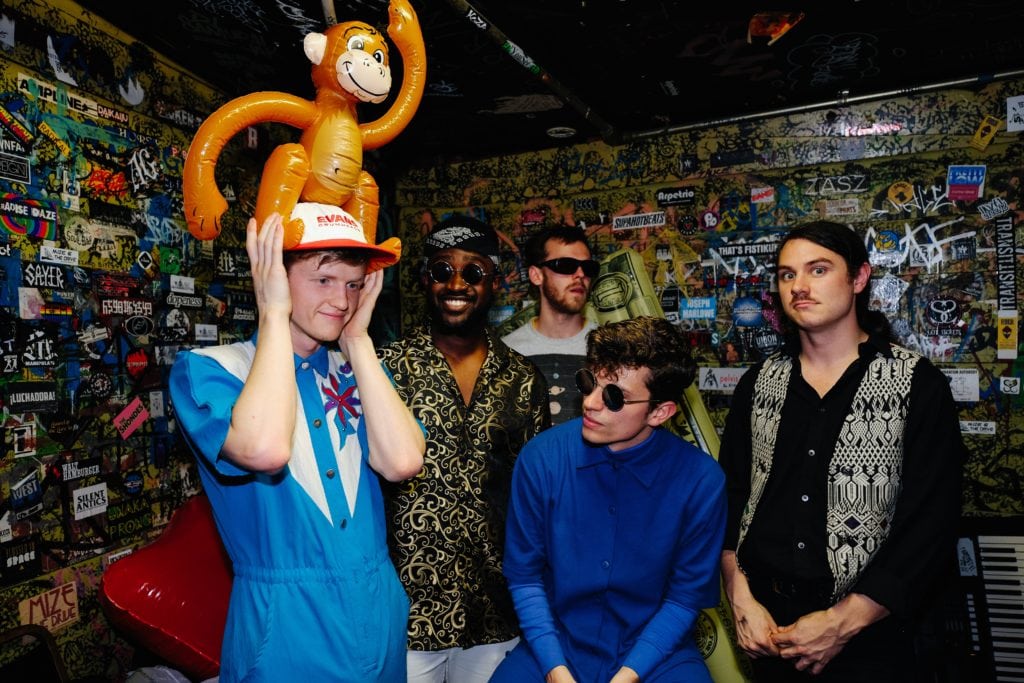Presented by Bowery Boston
Doors: 7:00 pm / Show: 8:00 pm
Tickets on sale Fri. 4/27 at 10AM!
Tickets available at AXS.COM, or by phone at 855-482-2090. No service charge on tickets purchased in person at The Sinclair Box Office Wednesdays-Saturdays 12-7PM.
Please note: this show is 18+. Patrons under 18 admitted if accompanied by a parent or legal guardian. Opening acts and set times are subject to change without notice. All sales are final unless a show is postponed or canceled. All bags larger than 12 inches x 12 inches, backpacks, professional cameras, video equipment, large bags, luggage and like articles are strictly prohibited from the venue. Please make sure necessary arrangements are made ahead of time. All patrons subject to search upon venue entry.
***
Mt. Joy
“These dreams are more than paper things,” sings Matt Quinn on Mt. Joy’s infectious folk-rocker “Astrovan,” a warm, yearning bit of road-trip philosophy that posits the existence of a Deadhead Jesus cruising the dusty highways of the countryside, nursing a roach on his way to only He knows where. It’s an auspicious line from a band predicated on the revival of teenage dreams.
Mt. Joy started off as a rekindling of shared musical ambitions between Philadelphia high school friends Matt Quinn (vocals, guitar) and Sam Cooper (guitar). Reunited in Los Angeles thanks to the ebbs and flows of adult life, the pair met multi-instrumentalist Michael Byrnes through a Craigslist ad. They named themselves Mt. Joy as an ode to a mountain in Valley Forge National Park near Sam’s childhood home, and together, with Byrnes’ roommate Caleb Nelson producing, they recorded three songs and sent them out into the world, hoping for the best. “I knew I still wanted to write songs, but the realities of life made that dream seem pretty impossible,” Quinn says.
Much to the band’s amazement, “Astrovan” accomplished the impossible. Without initial promotion or fanfare, the song took off on Spotify, racking up 5 million streams to date. “The irony of ‘Astrovan’ was that song was really about being stuck in a life and wanting to have the opportunity to pursue a dream, and in an instant it gave us that opportunity. ” Quinn says. Mt. Joy quickly transitioned from a part-time calling into a full-fledged band rounded out by Byrnes on bass, Sotiris Eliopoulos on drums and Jackie Miclau on keyboard.
Come 2017, Mt. Joy hit the road, and hit it hard: They played tour dates alongside the likes of The Shins, The Head and The Heart, The Lone Bellow, and Whitney, and popped up at some of the summer’s biggest festivals, including Bonnaroo, Newport Folk Festival, Lollapalooza and Made In America. “We were put on some big shows very quickly,” Quinn says. “The growth for us has been exponential – we’ve really just become a family that’s constantly pushing each other and the live show to be great.” They eventually caught the attention of Dualtone Records and began work on their debut album.
Steeped in folk-rock tradition and powered by the intuitive creative connection between Quinn and Cooper, the songs on ‘Mt. Joy’ depict Quinn wrestling with his own conscience, where the mundane and the fantastic collide as he processes tragedy, society, and love. Opener “I’m Your Wreck” describes “monsters in (the) closet, using up the wi-fi” as it cycles from its desperate, spiraling verses to its swinging, stubbornly optimistic coda, while the loping, plaintive chords of “Younger Days” meditate on a frayed psyche and the fear of choosing the wrong path. “Sheep,” with its collapsing, hoarse-voiced cry of “freedom was paid in blood,” is a post-Trump salvo on the responsibilities of the fortunate to overcome political and social despondency. And on “Silver Lining,” perhaps the album’s brightest moment, Quinn surveys the damage of hard drugs and the vicious cycle of addiction, as the song’s melancholic sentiment kicks into its fervid, defiant chorus, all shout-along vocals and trilling guitars.
Taken together, the self titled ‘Mt. Joy’ LP is a startlingly open document, wracked with the anxieties and fears that come just as life seems to start working out. It’s a natural reaction from a wary band like Mt. Joy – the result of a sort of professional vertigo, as they’ve gone from virtual unknowns to hot young commodity in little over a year. But there’s a sense of hope underlying everything, girded by the fact that the Mt. Joy LP is an impressive, honest portrayal of a young band facing that moment where dreams become reality, and finding beauty in the exhilarating uncertainty of it all.
***
Arlie
It all started one ordinary day in the mines.
The year was 1816, and times were tough in small-town Arlia. As The Whistler left for work that morning, he wasn’t sure how he would afford to feed his standard poodle and his three beautiful, slimy piglets that night if he didn’t strike gold. Nonetheless, he turned the key, started up his mammoth, and rode off into the rising sun.
By late afternoon The Whistler had been chipping away at the subterranean rock walls for 7 sweltering hours, praying to the rock gods he would hear the resonant “cling” of a shiny new bitcoin, with each heave of his selfy stick– when all of the sudden, as if straight from Donald Almighty himself, a catchy little earworm wriggled its way into The Whistler’s temporal lobe.
He began whistling the tune aloud so that he would not forget it. As he went on, whistling and hacking away, he found himself smiling, overcome with a feeling that there was hope for the human race. He knew he must preserve this melody and share it with the world above ground, so that all might join in this bright hope.
Those around him in the mineshaft took note of The Whistler’s cheerfulness. It greatly irritated them, for there was certainly nothing to be cheerful about in 1816. They muttered to one another in disapproval, and one of the men asked The Whistler to stop whistling. But The Whistler did not notice, for he was so intently focused on his tune—one distraction and the melody might be lost forever.
The other miners, growing increasingly irritated, began to grumble and toss insults at The Whistler. Soon, one pebble-sized insult hit The Whistler on the shoulder. But The Whistler did not even flinch. Aggravated by The Whistler’s continued composure, the miners gathered around him, throwing larger and heavier insults, some leaving bruises and even breaking the skin. Yet The Whistler kept whistling away, now more determined than ever.
The Whistler knew that the others would go on throwing whatever libels and taunts they could find on the filthy cavern floor, until they ran out or grew tired. The Whistler knew the pain would be over soon. So he doubled down and maintained his focus. He was still faced away from the mob, whistling and chiseling at the Groovy Rock wall.
Just then, up from the back of the horde came the biggest, strongest, and meanest of them all, who was called Fork. Fork was not actually a miner himself, but he took it upon himself to tell the other miners what to do, and they all listened to his sharp words with trembling trepidation.
Fork approached The Whistler menacingly, lifting up a 375-pound Judgment in his massive meathooks. The others wanted to stop him, but they were afraid of Fork, for he was bigger and stronger than any three of them combined. Besides, they thought, even such a giant as Fork would surely not be able to pitch such a tremendous stone. But Fork stepped closer and closer to The Whistler, hoisting the great Ad Hominem higher and higher with each stride. When he was only two paces from The Whistler, he heaved the great Normative Boulder high over his head, ready to bring it down upon The Whistler by surprise.
However, there were four brave and noble souls among the miners, who were known as The Squad.
The Squad knew that only as a foursome could they overpower the mighty Fork. And so, seizing the moment, The Squad rushed at Fork. Each grabbing a limb, they tackled the giant to the ground with a heavy THUD!
At that very instant, as if triggered by the impact, a deep rumbling rose up from beneath the mine, along with a low-pitched roar emanating from the surrounding walls in all directions. The ominous sound grew louder and louder, the quaking stronger and stronger, until…
BUURRRRRP! A most foul wind with a force stronger than a hurricane swept the whole company off their feet. As they rocketed and spiraled through the cavern, they discovered they were not in a mineshaft after all, but inside of a Big, Fat Esophagus.
Before this could all sink in, they had passed through the Pharynx, the Larynx, and had to duck their heads as they whizzed under the Colossal Uvula and into the cavernous opening of a Big, Fat Mouth.
They saw taste bud hills beneath them, and white-capped, molar mountains further off on either side. Up ahead, blinding daylight shone through a wide opening, which, upon examination, appeared to be shrinking by the second. The Projectile Miners appeared to have no chance of escaping before the great gates shut. But at the last second, as if by a miracle, these five chosen ones were propelled into the free air just before the upper and lower incisors touched!
The Whistler and his newfound Squad were utterly bewildered. As they stared at each other in exuberant disbelief, they knew their lives would be forever changed. Beneath them was a new and unseen realm, a vast expanse of possibility.
Through the sky they fell, and they fell, and they fell. For two hundred years, they accelerated downward at 9.81 m/s^2. All the while, The Whistler had not stopped reciting his melody. Soon, The Squad joined in, understanding the significance of The Whistler’s mission without a word of explanation needed.
As they whistled on, it dawned upon the Five Falling Miners that they would never again see their old mountain home. So they named themselves “Arlie,” as a tribute to their homeland. With no distractions, Arlie had plenty of time to streamline their whistling embouchures for maximum volume output. By the time they’d been practicing only 100 years, the Whistler’s tune was so greatly amplified that it could be heard as far as the moons of Tatooine.
At last, in 2016 Arlie landed in a little town the locals liked to call “The Athens of the South,” hitting the ground at a final velocity of 61,875.6 x106 m/s, and they disintegrated on impact, right on 12th Avenue S. between Eldey’s Barbecue and Montrose Ave, where their remains splattered onto a white brick wall.





